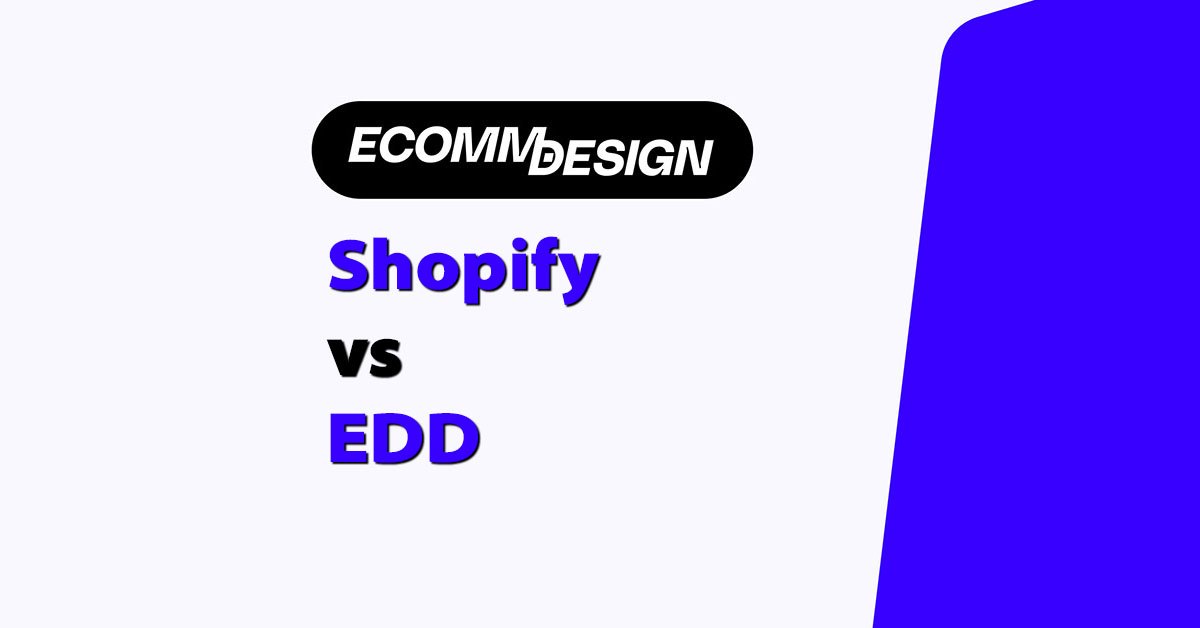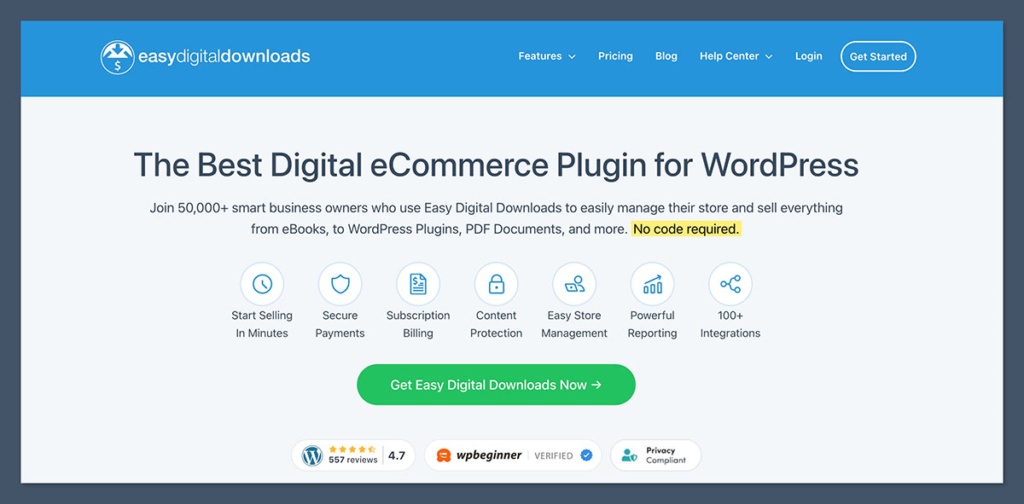
Selling digital products is a completely different game from selling physical goods. You don’t need inventory, shipping, or warehouses, but you do need the right eCommerce platform.
Shopify and Easy Digital Downloads (EDD) are two of the biggest options, but they cater to very different business models.
Shopify is a hosted, all-in-one platform that makes it easy to start selling digital and physical products without any technical knowledge.
On the other hand, Easy Digital Downloads is a WordPress plugin designed specifically for selling digital products like eBooks, courses, and software. Since it’s self-hosted, you get full control, but it comes with more setup responsibilities.
The right choice depends on what you’re selling, how much control you need, and your technical comfort level.
Below, I’ll break down their differences in pricing, features, customization, and ease of use—so you can pick the best platform for your digital business.
Quick Comparison: Shopify vs Easy Digital Downloads
If you want an out-of-the-box solution that takes care of everything, Shopify is the better option. It includes hosting, security, and built-in tools for selling digital downloads.
You don’t need any technical experience—just sign up, add products, and start selling.
On the other hand, if you’re comfortable managing a WordPress website and want full control over your store, EDD is a strong alternative.
Since it’s built specifically for digital products, you don’t have to worry about unnecessary features for physical goods.
Plus, there are no transaction fees, and you only pay for the features you actually need.
Key Differences Between Shopify & EDD
| Feature | Shopify | Easy Digital Downloads (EDD) |
|---|---|---|
| Best for | Selling digital & physical products | Selling digital products only |
| Ease of Use | Super beginner-friendly | Requires WordPress knowledge |
| Customization | Limited unless using apps | Fully customizable with WordPress |
| Built-in Features | Strong but app-dependent | Focused on digital sales, fewer apps |
| Payment Options | Shopify Payments + 100+ gateways | PayPal, Stripe, others via extensions |
| Transaction Fees | Yes (unless using Shopify Payments) | No extra fees |
| Pricing | $39/month+ (plus potential app costs) | Free core plugin ($99+ for extensions) |
| Scalability | Great for growing businesses | Depends on your WordPress hosting |
Pros and Cons
Pros of Shopify
- Super easy to use, even if you’ve never built a website
- Drag-and-drop editor makes building fast
- No coding needed to launch a pro-looking store
- Scales well — handles tiny stores and high-volume traffic
- Thousands of apps to expand your store
- Sell on Instagram, Amazon, Facebook, and more
- Built-in tools for SEO and email marketing
- Solid hosting with fast speeds and security
- Great 24/7 support
- Mobile-friendly templates out of the box
Cons of Shopify
- Monthly fees stack up, especially with paid apps
- Extra transaction fees if you skip Shopify Payments
- Deep design customisation often needs a developer
- Limited flexibility unless you learn Liquid
- Some premium themes and features cost more
- App overload can slow down your store
- Locked into Shopify’s ecosystem
Pros of EDD
- Way more flexible than Shopify
- Built on WordPress, so you can change anything
- No transaction fees — keep more of your money
- Total control over your site’s design and features
- Integrates deeply with WordPress plugins
- Great for selling memberships, subscriptions, and digital goods
- No monthly fees — just pay for hosting and any add-ons
- Scales well if you’ve got the right setup
- Ideal for tech-savvy users who want full control
- Solid community and plugin ecosystem
Cons of EDD
- More setup time and learning curve than Shopify
- You have to manage your own hosting (about $5–$15/month)
- You’re responsible for security and backups
- Compatibility issues can pop up with themes or plugins
- Not beginner-friendly — you’ll need some WordPress experience
- No built-in support team like Shopify
- Premium features may require paid extensions
- Can get complex fast if you don’t know WordPress well
Both platforms work well for digital sales, but they cater to very different types of entrepreneurs. Let’s go deeper into how each one works.
Shopify: The All-in-One eCommerce Solution

How Shopify Works
Shopify is a fully hosted eCommerce platform, which means everything—including hosting, security, and updates—is handled for you.
It’s one of the easiest ways to start an online store, whether you’re selling eBooks, courses, music, or memberships.
Since Shopify supports both digital and physical products, it’s a great choice if you think you might expand beyond digital sales in the future.
The platform includes built-in tools for handling payments, customer management, and marketing, making it a strong option for beginners.
The setup process is simple:
- Sign up for Shopify and choose a theme.
- Install the Digital Downloads app to enable file delivery.
- Upload your digital products and set pricing.
- Customize your store and launch your business.
Easy Digital Downloads: The Digital-First Platform

How EDD Works
Easy Digital Downloads (EDD) is a WordPress plugin built exclusively for selling digital products.
Unlike Shopify, it doesn’t include hosting or a website builder—you’ll need to have a self-hosted WordPress site to use it.
Because EDD is designed specifically for digital products, it’s a lot more lightweight than Shopify.
There are no unnecessary features for shipping or inventory, and everything is optimized for selling downloads, licenses, and subscriptions.
The setup process is straightforward if you’re familiar with WordPress:
- Install WordPress and set up your hosting.
- Download and activate the EDD plugin.
- Configure payment gateways like Stripe or PayPal.
- Upload and start selling your digital products.
EDD also lacks some of the built-in features Shopify offers, like abandoned cart recovery and automatic tax calculations. If you want these tools, you’ll need to install additional plugins, which can increase costs.
Final Verdict: Shopify vs EDD – Which One Should You Choose?
| Pick Shopify if… | Pick EDD if… |
|---|---|
| You want an all-in-one, no-fuss platform | You want full control & lower costs |
| You sell both digital & physical products | You only sell digital products |
| You don’t want to deal with WordPress setup | You’re comfortable managing a WordPress site |
| You need built-in marketing & sales tools | You want to avoid monthly fees & transaction costs |
Both platforms work well for selling digital products, but the best choice depends on how much control you want and how comfortable you are with WordPress.
If you want simplicity, go with Shopify.
If you want full control and flexibility, EDD is the winner.



